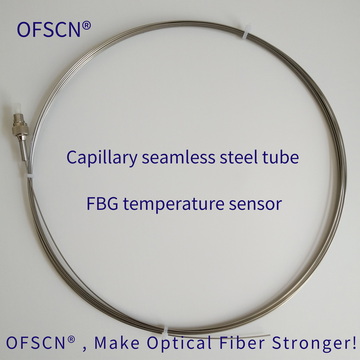Application of Fiber Bragg Grating Sensing Technology - Application of FBG Sensor - Application of FBG-Application of FBG Demodulator - Application of FBG Sensing in Industry
FBG Sensing Technology for the Temperature Monitoring of the Baking Process
Fiber grating sensing technology has numerous applications in the food industry, including temperature monitoring of the baking process. In this article, we will explore the principles of fiber Bragg grating sensing, the demand for temperature monitoring of the baking process, the difficulties involved, and how fiber grating sensing technology can help solve these problems. In this article, we will discuss the problems that fiber grating sensing technology can solve, and how Beijing Dacheng Yongsheng Technology Co., Ltd.(short for DCYS ) can help to monitor the temperature of the baking process in food industry.
Fiber Bragg Grating Sensing Principle:
Fiber Bragg gratings (FBGs) are periodic structures that are inscribed in the core of an optical fiber. These structures reflect a specific wavelength of light that is determined by the periodicity of the grating. When the grating is subjected to mechanical or thermal strain, the reflected wavelength changes in a predictable manner. By monitoring the reflected wavelength, changes in strain, temperature, and other parameters can be detected. FBG sensors can be used to monitor a wide range of parameters, including strain, stress, temperature, and vibration.
Click the link below for more details:
Demand Analysis for Temperature Monitoring of Baking Process:
Temperature monitoring is critical in the baking process to ensure that the product is cooked thoroughly and has the desired texture, flavor, and appearance. In the food industry, temperature monitoring is also essential for food safety and regulatory compliance. Therefore, temperature monitoring is an essential requirement for the baking process in the food industry.

Why Temperature Monitoring of the Baking Process is Needed:
Temperature is a crucial parameter in the baking process as it affects the quality, texture, taste, and safety of the final product. Accurate temperature monitoring is essential to ensure that the baking process is performed correctly and that the final product meets the required standards. Moreover, the baking process is usually carried out at high temperatures, which can cause damage to the equipment and pose a risk to the operators. Therefore, continuous monitoring and control of temperature are necessary to ensure the safety of the operators and the equipment.

Difficulties in Temperature Monitoring of Baking Process:
The baking process is complex and involves multiple steps that require different temperature ranges, durations, and heating rates. The temperature can also vary within the baking chamber due to variations in the airflow, radiation, and convection. The traditional methods for temperature measurement, such as thermocouples and thermistors, are often affected by electromagnetic interference, which can result in inaccurate readings. Moreover, these methods require direct contact with the product or the baking chamber, which can be challenging to implement in large-scale production facilities.
What Problems can be Solved by FBG Technology:
Fiber grating sensing technology can solve many of the challenges associated with temperature monitoring in the baking process. Fiber gratings are highly sensitive to temperature changes, and their response is linear and repeatable. They can be embedded in the baking chamber or attached to the surface of the product, allowing for non-invasive temperature measurement. Moreover, fiber gratings are immune to electromagnetic interference, and their small size and flexibility make them easy to install and integrate into the production process.
Recommended fiber grating temperature sensors:
Beijing Dacheng Yongsheng Technology Co., Ltd.:
Beijing Dacheng Yongsheng Technology Co., Ltd.(short for DCYS) is a professional manufacturer of fiber grating sensors, fiber grating demodulators and system software. Specializing in the production of various fiber grating sensors, including temperature, strain, stress, displacement, vibration, shape sensors, etc. DCYS also produces fiber grating demodulators, and can customize and develop related application software.
Recommended fiber grating demodulator:
Product Alias: Fiber Bragg Grating Interrogator, FBG Interrogator, FBG Sensor Interrogator, Fiber Optic Grating Interrogator, Fiber Bragg Grating Demodulator, FBG Demodulator, Fiber Optic Grating Demodulator
This product is produced by DCYS, and it is a high-speed high-frequency fiber Bragg grating demodulator(Interrogator). The fiber grating demodulator is compatible with various specifications and models of OFSCN® fiber bragg grating sensors (temperature, strain, stress FBG sensors, etc.). It features adjustable port density (4, 8, 16 channels) and high-speed high-refresh rate capabilities.
DCYS Helps to Monitor the Temperature of the Baking Process:
DCYS has extensive experience in providing temperature monitoring solutions for various industries, including the food industry. DCYS‘s fiber grating sensors can measure temperatures up to 1000°C with high accuracy and repeatability, making them suitable for the high-temperature baking process. DCYS's demodulators can process multiple sensor signals simultaneously, allowing for real-time monitoring of the baking process.
Moreover, DCYS can provide customized solutions tailored to the specific requirements of the food industry. DCYS can help design and install the fiber grating sensors in the baking chamber or on the surface of the product, ensuring accurate and non-invasive temperature measurement. DCYS's system software can collect, process, and visualize the temperature data, allowing operators to monitor and control the baking process in real-time.

Other Points Need to Be Clarified:
Fiber grating sensing technology is a promising solution for temperature monitoring in the baking process in the food industry. It offers high accuracy, repeatability, and non-invasiveness, addressing many of the challenges associated with traditional temperature measurement methods. Beijing Dacheng Yongsheng Technology Co., Ltd. has the expertise and experience to provide customized solutions for the food industry, ensuring the safety and quality of the final product.
